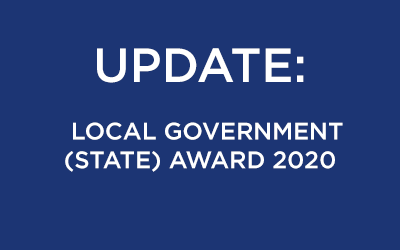This USU update follows on from the previous update dated the 8th of February 2022, which covered your right to access your annual and/or long service leave in a flexible manner.
This update informs you of your options in applying for leave as well as options regarding what you can do with any excess leave accruals.
Many of our USU members employed in NSW Local Government may be unaware of their options in how they may apply to take their annual and/or long service leave.

Annual Leave is covered by the Award in Clause 22. D and Long Service Leave is covered by the same Clause in section E.
Annual Leave accrual rates for the vast majority of workers covered by the Award is 4 weeks per year, however those employed to work on a 7 day a week rotating roster system on a regular basis are entitled to 5 weeks leave per year under Clause 22. D Amount of Annual Leave (i) (b), and for those long-term employees who are based out west of the line (normally west of the Newell Highway) see detail in Clause 44. Savings and Transitional (iii) who are with the same Council and who were in positions deemed as Salaried Officer positions prior to the 11th of May 1995, also should continue to be entitled to their 5 weeks per year.
Long Service Leave under your Award is accrued at a rate of 1.3 weeks per year for the first 15 years and is accessible after 5 years of service and increases to an accrual rate of 2.2 weeks per year for each year after 15 years of service.
Casual employees receiving the Casual loading are not entitled to accrue any leave however should they later become permanent or permanent part time their casual employment period may count towards recognised service for the purpose of when they would be entitled to access any accrued leave. Accrued annual and long service leave is not forfeited on resignation, death or termination but should be paid out with the severance pay. However, you must have 5 years’ service to access your long service leave.
Options for applying for annual and or long service leave include half pay, full pay and double pay, however access to half pay and double pay are at the employer’s discretion, but if unreasonably refused the USU would reserve the right to dispute the refusal on behalf of any members.
Half pay is often used to extend paid leave for those who have used their paid parental leave and want to continue on paid leave as long as possible as well as for those who may be transitioning to retirement or for a variety of other reasons.
Double pay is often useful to cover the costs of taking a holiday to afford travel or a better-quality holiday, or to reduce leave accruals while taking less time away from work as some members may prefer at times. It has the benefit for the employer in reducing costs to replace staff who are on leave by reducing the period needed to replace someone.
Access to double pay for annual leave is limited however to the employee being required to have a minimum annual leave balance of 4 weeks at the end of the leave period.
There is no minimum long service leave balance required under the Award to access long service leave at double pay, however the employer must have at least 5 years’ service to access long service leave.
Cashing Out of Accrued Leave.
Employees may request payment in lieu of annual leave under Clause 22. D (vi) however they must have a minimum balance of accrued annual leave of 4 weeks after receiving any payment in lieu of annual leave.
Employees can request to cash out part of their accrued long service leave under Clause 22. E (v) (a) and (b).
Excess long service leave is the portion of leave accrued in excess of the Long Service Leave Act which is calculated at an accrual rate of 0.867 weeks per year of service.
As a result of the NSW Local Government State Award providing an annual LSL accrual rate of 1.3 weeks per year for each of the first 15 years of service, which significantly increases to 2.2 weeks for each year of service above 15 years, the leave accrued above the LSL Act accrual rate of 0.867 weeks per year can be legally requested to be cashed in. For example, a worker with 10 years of accrued LSL being 13 weeks could request to cash in almost 5 weeks of leave while taking the rest or, for example asking for some or all to be taken at double pay.
Excess LSL as referred to above can also be salary sacrificed into your superannuation contributions under Clause 15. Superannuation and Related Arrangements, however we would advise you to seek financial advice first so as not to exceed the annual maximum contribution.
Your award provides many options which can be of great assistance when understood and claimed, but these are only useful if you know of them and have access to the correct advice and assistance such as is available from your union the USU.
Such access to your award options as referred to above could provide the resources to have a better holiday or to cover that unexpected debt.
The USU is always there for our members and welcomes those who will respect and support their fellow members and the rules of the Union should they choose to join so they can access the wealth of knowledge, advice and assistance that we can provide to our members when needed.




